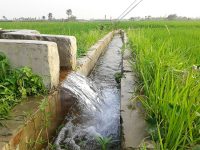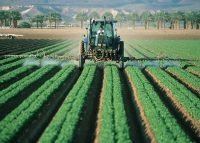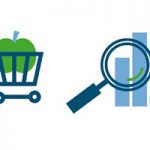Sustainability is a word that you’ll hear a lot these days, especially as industries try to become more eco-friendly. The food industry has been lagging behind in the world of sustainability, and in order to keep up with national and international food demands, it is difficult to implement the kind of change that is necessary to make the world a little greener. However, that doesn’t mean that food companies shouldn’t try. The following are some sustainability strategies that might be easier to implement in the food industry.
Water Conservation

While the majority of the Earth’s surface is covered in water, only about 3% of that water is drinkable—and 2 of that 3% is frozen in the planet’s glaciers and ice caps. This is why water conservation is so important. According to the United States Geological Survey (USGS), roughly 39% of fresh water used in the United States is used to irrigate crops.
Switching from flood irrigation with sprinklers to drip irrigation can reduce water usage.
Wastewater reuse is also a new technique that is gaining traction in the food industry. While it isn‘t practical in all situations due to the technology needed to remove chemicals and impurities from the wastewater, it can help reduce water waste and water use in the food industry. Simply reviewing water usage and switching to procedures that are less water-intensive can save a company money and reduce its overall water usage.
Natural Pest Control
Pesticides and fertilizers are among some of the most dangerous chemicals in the food industry. For largescale operations, however, they are necessary to ensure a large and healthy harvest. Some companies, such as Kemin Industries, are shunning these typical processes in favor of more sustainable options.
“Our mission at Kemin is to improve the quality of life for more than half the world’s population, and we believe sustainability plays an important role in our work,” said Dr. Chris Nelson, president and CEO of Kemin Industries. “Our FORTIUM line of rosemary-extract-based ingredients uses Kemin-grown rosemary for maximum effectiveness against color and flavor degradation. Kemin is the only rosemary supplier that is certified SCS Sustainably Grown, and we’re one of the world’s largest growers of vertically integrated rosemary.”
Vertical integration doesn’t have anything to do with how the rosemary is grown. In the agriculture industry, it means Kemin owns the entire supply chain for its rosemary, from field to processing to distribution.
“We use botanicals—spearmint, oregano, marigold and potato, in addition to rosemary—in our other products as well,” continued Nelson. “As an ingredient manufacturer, we understand the value of good suppliers. When the planet is supplying us with the ingredients we use in our products, it’s important to us that we are responsible in our growing practices.”
Sustainable Distribution
Distribution is one of the biggest problems when it comes to creating eco-friendly and sustainable supply chains. Upwards of 70% of the products in the United States are transported by truck, and each of those trucks generates CO2 and greenhouse gases.
There are two plans of attack for sustainability in food distribution: Reducing the distance food needs to travel, and upgrading trucks to use greener fuel options like biodiesel or electricity, such as the ones Tesla is offering.
Reducing the emissions created by tractor-trailers could help make the entire process a bit more sustainable, although it would require a large investment to upgrade the distribution process.
Back to Their Roots
It’s only in recent decades that agriculture has started being sustainable in an effort to keep up with the demands of the consumer. By going back to our roots and focusing on farming techniques that promote things like soil health—by rotating crops instead of using artificial fertilizers—and lowering water use and pollution, agriculture can become sustainable once again.

Modern agricultural techniques are detrimental, both to the environment and to the people who work there. These methods ensure we have enough food to supply consumers, but they lead to soil depletion and groundwater contamination. In addition to this, it can also lead to the degradation of rural communities that would normally be centered on farm work. That’s because corporate farms focus on quotas and large harvests without the community angle.
These commercial farms also cost more to run, and many have poor conditions for farmworkers because of the harsh chemicals used to kill pests and fertilize depleted topsoil.
Farm numbers have dropped since the end of World War II, with corporate farms taking the place of smaller family farms. While the number of farms has dropped, the remaining farms have increased in size. The average farm in 1875 was roughly 150 acres, and there were more than 4 million of them. Today, less than half that number remains, but the average size of the farms has increased to more than 450 acres.
Sustainability is a popular buzzword right now, but it’s a lot more important than most people believe. Switching to sustainable practices, whether that means changing production, distribution or anything in between, will help ensure the food industry can keep fresh, healthy food on our table for decades to come without damaging the environment. Sustainability is something that should be adopted by every industry, especially agriculture.








